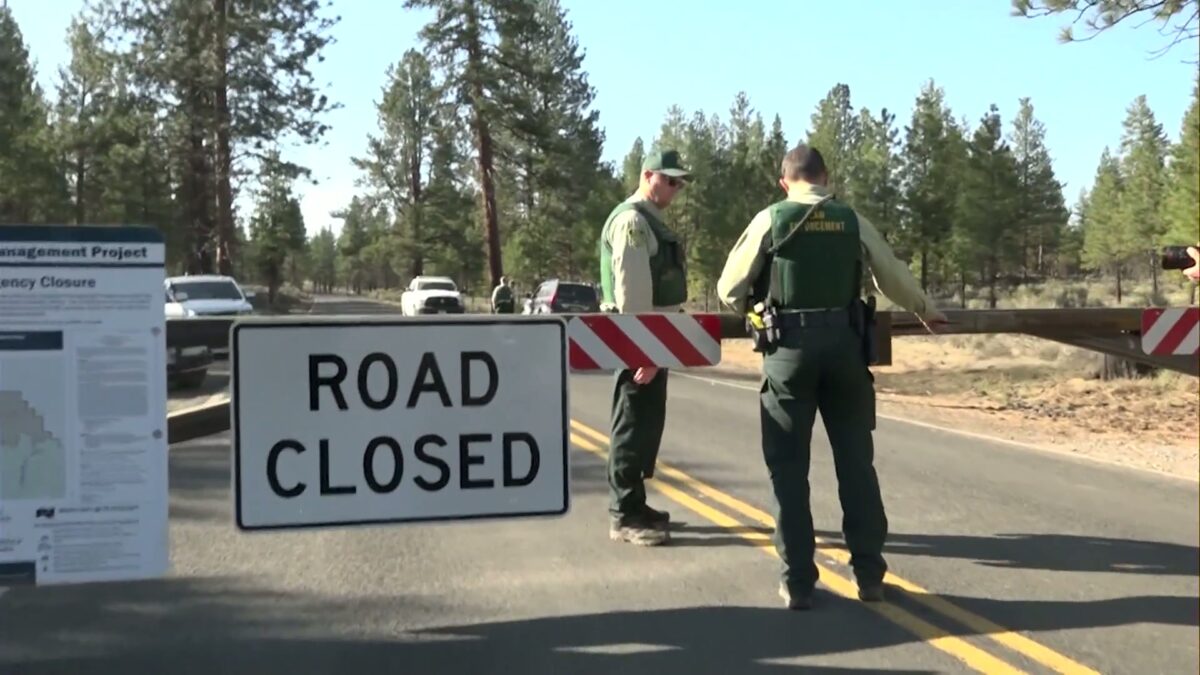Forest Service closes China Hat gate as ‘scared’ homeless scramble to move on: ‘The answer is housing, not handcuffs’

Isabella Warren
(Update: Adding video, comments from Forest Service, advocates, homeless)
BEND, Ore. (KTVZ) — The gate on China Hat Road south of Bend swung shut early Thursday, closing a large area of homeless encampments on the Deschutes National Forest as dozens of people who had been living there, some for years, scrambled to leave and take as many belongings as possible to wherever they go next.
One of the people forced to leave, Chris Daggett, has been helping people move out. He told KTVZ News: “It’s to the point where some of these people are — you only have so much supplies. They’re scared. And they’re gonna lose their stuff. I can only bring so much stuff in my trucks.”
Advocates were out early to provide food and water
Eric Garrity, with the Bend Equity Project said, “Unfortunately, we’re going to put as much effort in, but we are going to lose contact with people. And so that means that, possible placement and housing is going to be delayed or those opportunities will be lost entirely.”
Homeowners near the encampment have long complained, citing filth, fire and fentanyl, among other concerns.
The Forest Service says the project will protect those homes. Kaitlyn Webb said, “Our goal is to reduce wildfire risk to those adjacent communities and promote and restore forest health. “
Three months ago, the Forest Service notified China Hat Road campers that the area would be shut down for over a year, starting now.
Two advocates, Chuck Hemingway and Garrity, along with disabled homeless people in the area, sued the federal government, filing a temporary restraining order to pause the May 1 closure. But days before the deadline, a federal judge denied that plea.
Garrity said, “At the end of the day, most of the people who are there, their only crime is not being able to afford the frankly absurd cost of housing in Bend. ”
The area will now be thinned as part of forest mitigation, and campers left behind could face a fine of $5,000 or jail.
“Our goal is voluntary compliance of the closure. Our law enforcement officers and our staff will be patrolling and enforcing the closure, and citations will be issued if needed,” the Forest Service spokeswoman said.
Critics of Forest Service move hold news conference: ‘The answer is housing – not handcuffs’
Meanwhile, advocates and others involved in the issues held a news conference to decry the Forest Service’s forced relocation of dozens of people.
“The only answer to homelessness is housing – not handcuffs,” said Garrity.
“This helps no one,” said Jesse Rabinowitz, campaign and communications director for the National Homeless Law Center. “The government needs to focus on housing and help.”
He said it’s believed to be the largest forced relocation of homeless people from federal land in recent years.
Chuck Hemingway, another Bend homeless advocate part of the federal lawsuit, said the area has been home to up to 200 people at up to 90 encampments across 900 acres.
“This was their home,” he said. “The people who lived there were a microcosm of society. Quite a number of working people, a large number of disabled and elderly. The numbers grew with the high cost of housing in Bend – sure, some bad actors gave it a bad name.”
“We understand the need for fire mitigation,” he said, but are “disappointed there was an organized effort by the Forest Service that would have (allowed) an orderly relocation. Instead, what resulted in a mad mass exodus” until early Thursday morning.
Among others speaking at a news conference by the closed gate was Mandy, a native Oregonian who settled in Bend in 1999, left in 2007 and returned in 2018 to end an abusive relationship. Her ex-partner kept trying to find her, and so without help from local law enforcement, “I felt there was no other option, so I went out in the woods.”
“That’s a mild story, compared to other campers,” she said. “It’s sad that this is what it’s come to. People forget that we’re human. We’re not all out here because we’re drug dealers, or crooks. We made wrong choices – not bad choices.”
Dr. Graham Pruss, executive director of the National Vehicle Residency Collective, said: “Their crime is poverty, solved the only way they can – to turn a minivan, RV, pickup, camper shell into the safest homes they could afford.”
Since a Supreme Court ruling in a Grants Pass case, things have become even more challenging, as local governments pass new regulations and restrictions, Pruss said.
“In effect, we’re telling people to leave federal land but don’t come into town, abandon your vehicle but don’t sleep on the sidewalk. It turns human beings into trespassers.”
“We can do better,” Pruss said, calling for more safe parking and saying the forced move from the forest “simply shifts the burden from one jurisdiction to another.”
The advocates said they were not aware of anyone cited so far, but estimated that 40 to 60 people were still inside the now-closed area.